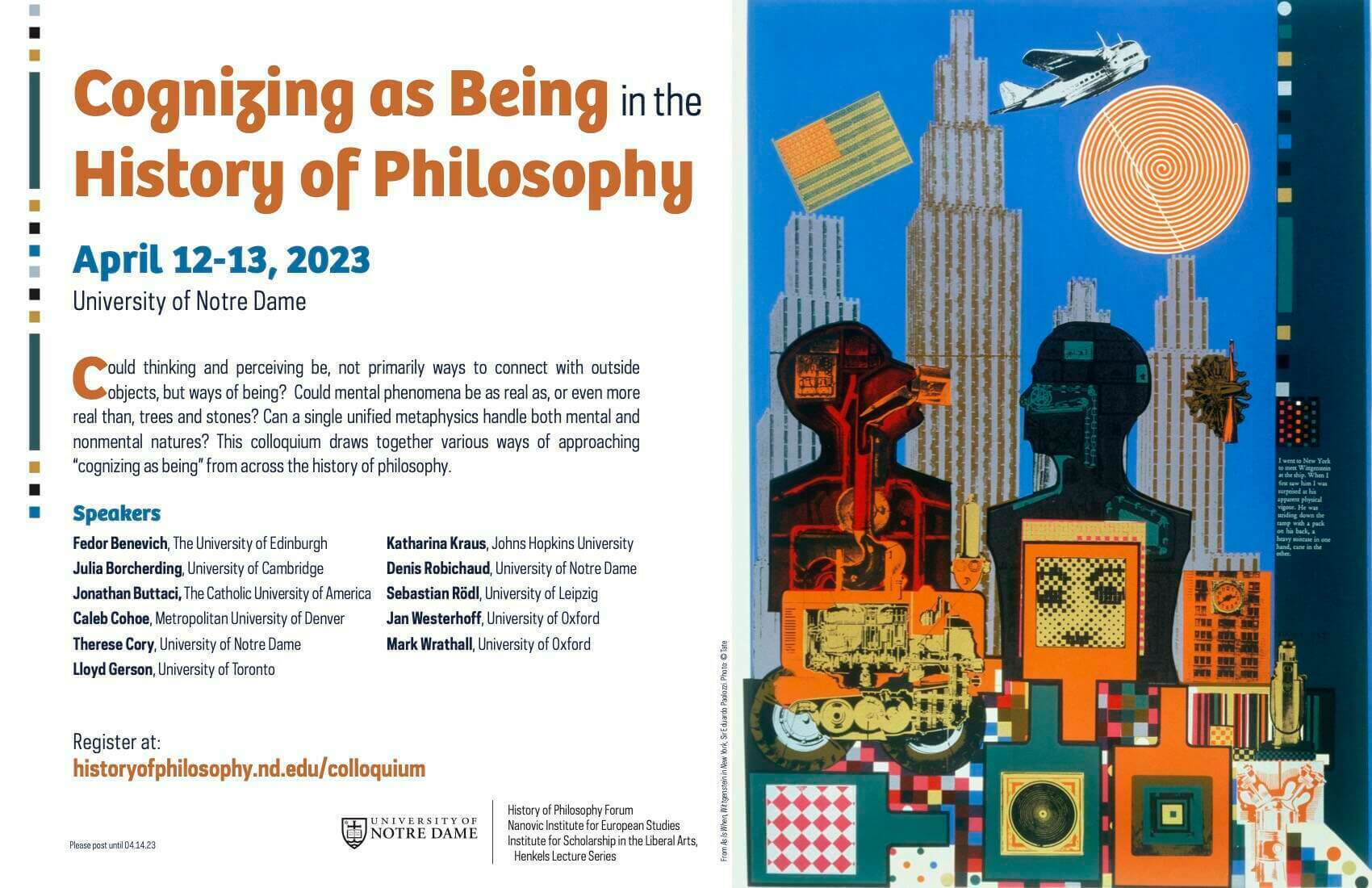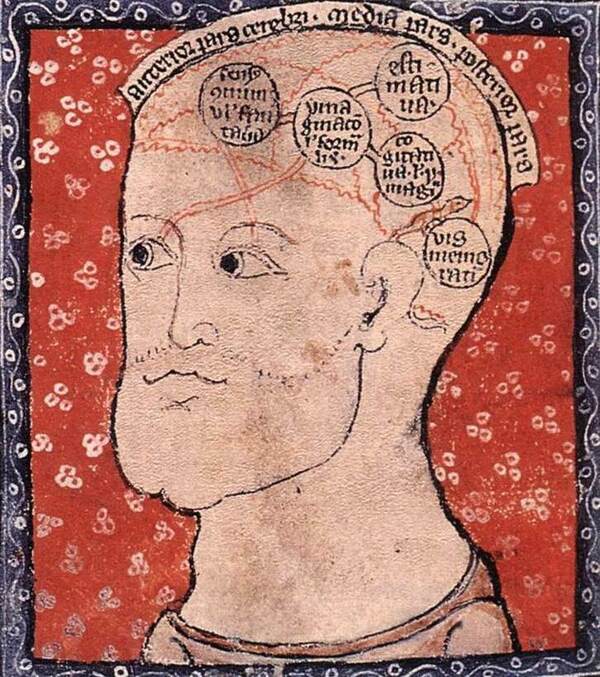2023: Cognizing as Being in the History of Philosophy
This year's colloquium, Cognizing as Being in the History of Philosophy, will take place on April 12-13, 2023.

Registration for the colloquium is now closed. You are welcome to tune in via Zoom using the link below!
Conference Program
Wednesday, April 12
All times in Eastern Daylight Time (EDT)
Unless otherwise noted, all Wednesday sessions will take place in the Oak Room, South Dining Hall.
8:45–9:20 a.m. Continental breakfast
9:20–9:30 a.m. Welcome
9:30–10:40 a.m. Subjectless Solipsism in Indian Yogācāra
Jan Westerhoff, University of Oxford
10:40 a.m.–11 a.m. Coffee break
11 a.m.–12:10 p.m. Aristotle on Intellectual Identity, Actual and Potential
Jon Buttaci, The Catholic University of America
12:10–1:30 p.m. Lunch, Hospitality Room, South Dining Hall
1:30 a.m.–2:40 p.m. Forms and Superforms: The Reflexivity of Human and Divine Nous in Aristotle
Caleb Cohoe, Metropolitan State University of Denver
2:40–3 p.m. Coffee break
3–4:10 p.m. The Inseparability of Intellect and Intelligibility in the Platonic Tradition
Lloyd Gerson, University of Toronto
4:10–4:20 p.m. Coffee break
4:20–5:30 p.m. The Substrate of Thought: A Problem in Medieval Metaphysics of Knowing
Therese Cory, University of Notre Dame
Thursday, April 13
Unless otherwise noted, all Thursday sessions will take place in Room 215 of McKenna Hall Conference Center.
8:45–9:15 a.m. Continental breakfast, 216 McKenna Hall
9:15–10:25 a.m. Suhrawardī’s Panpsychism and Its Origins
Fedor Benevich, University of Edinburgh
10:25–10:45 a.m. Coffee break
10:45–11:55 a.m. Our Being is Cognizing God: Plotinus, Iamblichus, and Ficino on Intellect and Unity
Denis J.-J. Robichaud, University of Notre Dame
12–1:30 p.m. Lunch, 216 McKenna Hall
1:30–2:40 p.m. Consciousness and Being in Kant and Fichte
Katharina Kraus, Johns Hopkins University
2:40–3 p.m. Coffee break
3–4:10 p.m. Universality, Opposition, and the Human Individual
Sebastian Rödl, University of Leipzig
4:10–4:20 p.m. Coffee break
4:20–5:30 p.m. Heidegger on Thinking and Being
Mark Wrathall, University of Oxford
5:30–6 p.m. Concluding discussion
For Zoom Attendees
Zoom links will be emailed to all registrants in advance and posted to this page.
If there is a handout for a talk, it will be posted in this folder.
Travel
For conference venues, please see the map of campus here.
For travelers arriving by air, we recommend booking your flight directly to South Bend International Airport (code: SBN). From the South Bend airport, the Notre Dame campus is approximately a 15-minute ride by car. Various transportation methods are available (e.g., taxi, rental car, limo).
For those preferring to fly to Chicago Midway or Chicago O'Hare and take ground transportation to South Bend, please note that there is no longer any bus service from Chicago to South Bend; it is necessary either to drive or to take the train (see below).
For train service, see Amtrak (www.amtrak.com; depending on the itinerary, it may be convenient either to travel to South Bend, Indiana, or to Niles, Michigan, which is about 25 minutes away). From downtown Chicago, there is also the option of the South Shore Line train, which will take you from the Chicago Loop (at the corner of Michigan and Randolph) to South Bend International Airport.
Accommodation
Hotels within walking distance of the conference venue are: The Morris Inn, Embassy Suites, Fairfield Inn, and Ivy Court Inn and Suites.
What is “Cognizing as Being”?

Roughly speaking, theories of “cognizing as being” represent a counterpoint to the three following trends, widespread in contemporary and historical Western theories of mind.
(1) cognizing as connecting, i.e., a way of framing the mental essentially or mainly in terms of its relationship to things intramental or extramental. This trend appears, e.g., in the view that cognition itself is a kind of relation, or that intentionality is the “mark of the mental,” or that thought consists in signification or representation or an object’s presentation to a subject. Again, concerns about mental “connectivity” animate familiar discussions about realism vs. representationalism, the productive nature of thought (as producing a mental word or sign), attentiveness as a directing oneself toward something, and the dichotomy of subject vs. object. One might associate connective approaches with visual or tactile metaphors.
In contrast: Theories of cognizing as being tend to frame the mental essentially or mainly in terms of possessing a certain kind of being (e.g., the being of experience, the being of consciousness, Intellect as Being itself, etc.). This tendency appears in theories that, e.g., identify the soul or mind with mental activity, or approach consciousness largely in terms of the stuff of which it is made, or that take the identity of knower and known very literally.
(2) the sui generis character of the mental, i.e., the tendency to use one set of conceptual categories to analyze conscious experience (e.g., concepts, faculties, ideas, contents, aboutness, attitudes, mental states, intentionality, qualia, etc.), and a wholly different set to analyze trees and tables and rocks (e.g., parts, wholes, properties, substrata, essence, individuating features, etc.)
In contrast: Theories of cognizing as being seek to bring mind into a unified metaphysical theory, e.g., by presenting the mental and non-mental as subject to analogous sets of the same categories, by identifying thought with Paradigmatic Being, by framing mind as a kind of nature, or by portraying mind as the very fabric of reality.
(3) diminishing the reality of the mental, i.e., the tendency to treat the mental as having diminished reality or somehow not “counting” ontologically. Consider the claim that ideas have no ontology, or the distinction between “mere” appearance and things as they “really” are, or the severing of phenomenology of experience (its subjective “feel”) from the underlying “real,” “objective” mechanisms, or the medieval distinction between “intentional being” vs. “real being.”
In contrast: Theories of cognizing as being take a more robust approach to mental being as one of the kinds of being that there are, or perhaps the most real kind of being, or even identical with being itself.